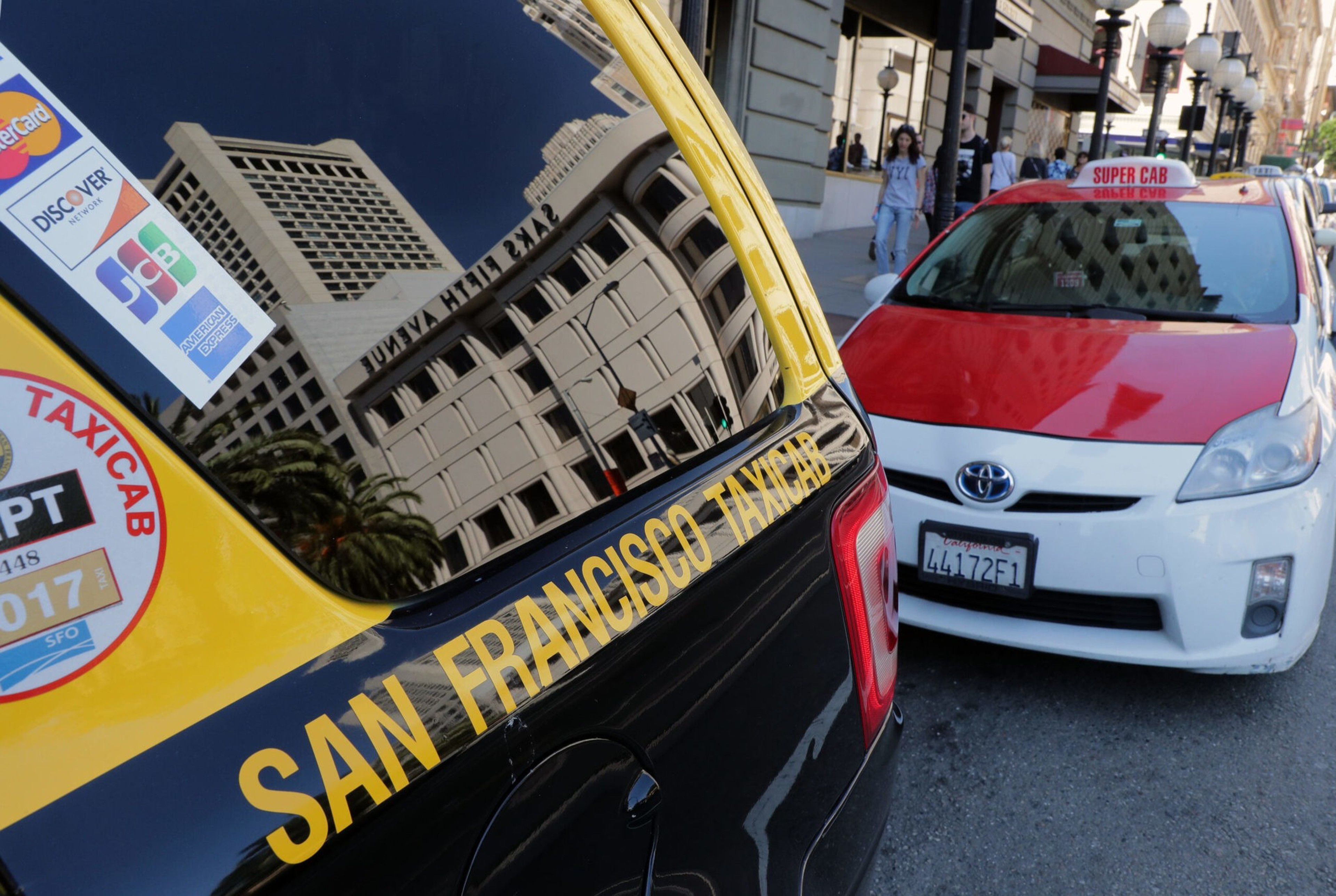The San Francisco Municipal Transportation Agency board on Tuesday approved a pilot program that would allow taxi cabs to be dispatched to serve customers of ride-hailing apps. The move could pave the way for a major shift in a taxi industry that’s been decimated by competition from Uber and Lyft.
A one-year pilot program, which expands on a measure initially approved last September, will give taxi riders the option of choosing a locked-in upfront rate based on metered rates. That’s meant to bring taxi pricing practices more in line with Lyft and Uber and combat “meter anxiety” caused by taxi riders watching the fare tic increase incrementally during their trip.
SFMTA said YoTaxi! And Flywheel—the city’s two taxi-hailing app operators—expressed interest in partnering with Uber to create a system where rides ordered through the Uber app could be dispatched by the taxi companies. Pricing of rides would be determined by Uber, rather than traditionally metered rates. According to a report (opens in new tab) from the New York Times, Flywheel and Uber are nearing an official deal.
“The sole purpose of our company is to modernize the taxi industry to be competitive in today’s world,” Flywheel President Hansu Kim said at the SFMTA meeting. “We can now provide pricing dynamically so you have a flat upfront price like the competitors do and passengers can actually price compare and see the prices are very close.”
SFMTA has set an Aug. 5 deadline for the implementation of the pilot, which is meant to gauge customer satisfaction, see how app pricing compares with metered rates and measure impact on traditional taxi trips.
San Francisco taxi drivers, already suffering from years of diminishing ridership, were especially hard hit by the pandemic. Average monthly rides declined from around 314,000 in 2019 to 91,400 in 2020, according to SFMTA data, while the average number of taxis in service monthly declined from 1,272 to 405 during the same period.
While ridership has ticked up since then, the industry is still struggling and supporters have positioned the new program as a potential life preserver.
“This has the potential to unlock an immense amount of customers for an industry that has a demand problem and has had it for a very long time,” said SFMTA board member Manny Yekutiel, who voted to approve the program.
The San Francisco Taxi Workers Alliance, a local taxi drivers’ union, opposes the program because it does not require the ride-hailing apps to match taxi meter rates. The union argues fares set by Uber won’t be enough to support taxi drivers who may have additional costs like loan payments for taxi medallions.
The union also argued for standardized commissions for Uber and Flywheel and additional transparency measures.
“Many of these answers are just a contract between two private companies. You have no regulatory control over Uber and we don’t know how public this information will be,” Evelyn Engel, an executive board member of the San Francisco Taxi Workers Alliance said at the SFMTA meeting. “We know when there’s a global monopoly it’s not going to be win-win for everybody and the ones that are generally hurt are the workers.”
Some taxi operators, however, supported the idea as a game-changer.
“I feel like this is the way to save this industry and go forward and change the dynamic,” said veteran taxi driver Muwaffaq Mustafa at the meeting.
Kate Toran, SFMTA’s director of taxis, access and mobility services division, said taxi drivers would be able to see where their ride requests originate and can decline rides from Uber or Lyft. But they likely won’t be able to see fares upfront because the agency does not want to disincentivize shorter rides.
Last month, Uber partnered with New York City taxi ride-hailing apps Curb and Arro, adding around 14,000 yellow cabs that are able to receive trip requests from Uber riders. One major difference is that both riders and drivers in New York can see upfront fares.
Uber has also partnered with the industry in Japan, Germany and South Korea.
“I will tell you we wanna get every single taxi in the world onto our platform by 2025,” Uber CEO Dara Khosrowshahi said in a CNBC interview (opens in new tab) after the New York deal was announced.
